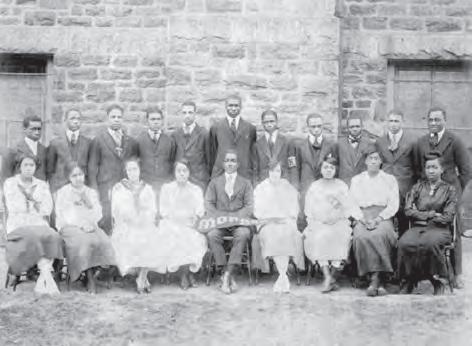
8 minute read
Introduction
The Past as Prologue: Morgan’s 2011–2021 Strategic Plan
Founded in 1867 by an interracial coalition of ministers of the Methodist Episcopal Church, Morgan State University — Centenary Biblical Institute then — was part of an educational movement in Baltimore City that had begun to move African Americans slowly up the socioeconomic ladder in the late 18th century. By the beginning of the tenure of its 10th president, David Kwabena Wilson, Ed.D., in July 2010, Morgan was a well-set pillar of Baltimore City and the region, having prepared generations of students for careers in critical areas such as education, social work and civic governance and having laid the academic groundwork for many who went on to excel in fields such as medicine and the law. The University’s influence in what is now known as STEM (science, technology, engineering and mathematics) had also been growing for decades and had flourished with initiatives such as the founding of the Clarence M. Mitchell Jr. School of Engineering in 1984.
1867
1984
Morgan Graduating Class of 1917


STEM Initiatives
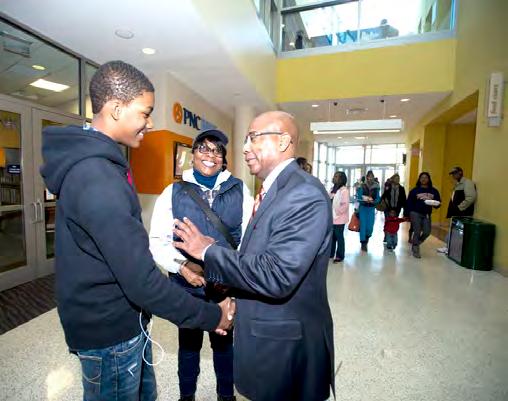
David K. Wilson, Ed.D.
Morgan had represented a rare opportunity for a large percentage of its students, those who were members of racial or income groups traditionally denied higher education. And thousands had made the most of that opportunity, benefiting their communities, the city, the state and the nation as well as themselves and their families. The question that faced Morgan’s new president was how best to extend Morgan’s success. In his second month in office, Dr. Wilson initiated a strategic planning process to determine the course of Morgan’s journey during the next 10 years and to fulfill the aspirations of the University’s new motto, “Growing the Future, Leading the World.” The Strategic Plan Steering Committee he appointed was composed of members of the University’s Board of Regents, faculty, students, staff, alumni, administrators and deans, in addition to representatives of the neighborhood and local business communities, who met over several months to receive input from the Morgan community. The end product of the committee’s work, “Growing the Future, Leading the World: The Strategic Plan for Morgan State University, 2011–2021,” redefined the institution with new vision and mission statements and a set of core values, all supporting five strategic goals to be addressed with strategic initiatives with measurable results. In his closing remarks to new graduates at Morgan’s Commencement exercises, Dr. Wilson always includes a celestial metaphor:
We have challenged you in every respect, and we have dared you to dream dreams bigger than those you had when you entered this institution. We have summoned you along the way to reach for the stars, and then we have cautioned you that if indeed you grasp that star, that perhaps your aspiration was simply not great enough.
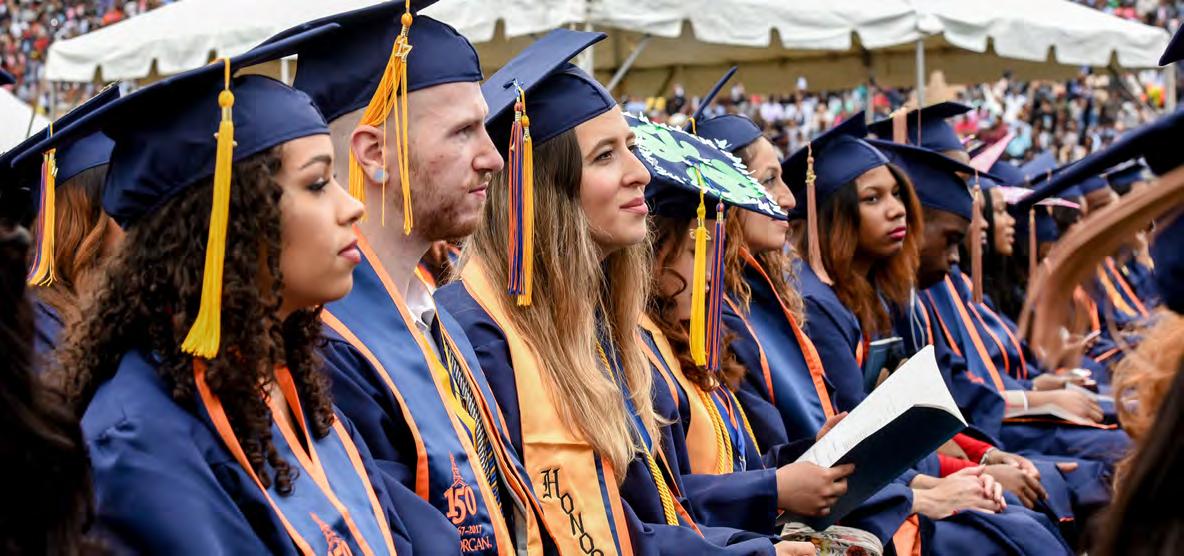
These words applied as well to the broader Morgan community as it reached for the goals of the 2011–2021 Strategic Plan. Over the past nine years, the University has grasped a remarkable number of the plan’s ambitious objectives, well ahead of schedule, and has extended its reach even further toward greatness. Within a decade’s time, a new era of prosperity has emerged: an era punctuated by innovation and emboldened momentum and fueled by sustained growth, development and expansion. Welcome to the new ‘Morgan Modern Era! ‚ n
This Leader in Mind
More than 2,000 attendees gathered for the formal installation of Morgan State University’s 10th president, David K. Wilson, Ed.D., on Oct. 21, 2010. The event took place in the Gilliam Concert Hall of the University’s Murphy Fine Arts Center. “Best wishes to Dr. David Wilson and to Morgan State University from President Barack Obama and from Education Secretary Arne Duncan,” said John S. Wilson Jr., Ph.D., executive director of the White House Initiative on HBCUs, who was among the speakers for the occasion. “Both of them have looked across the globe and have said, ‘Those who out-educate us today will outcompete us tomorrow.’ And they insist that our colleges, HBCUs, must be strengthened to ensure that America is not out-educated. The fact is, we need a surge in quality and productivity from HBCUs, and that will require, among other things, a new surge of productivity and quality from HBCU leadership. And I want everybody in here to know that Dr. David Wilson is just the kind of leader we have in mind.”
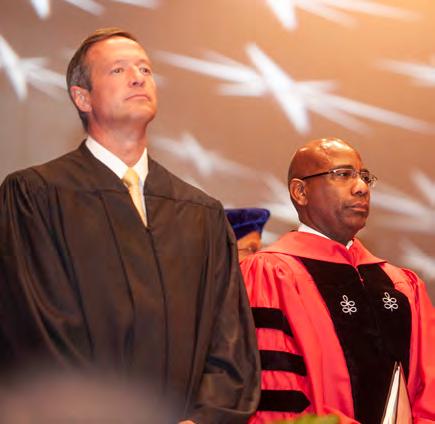
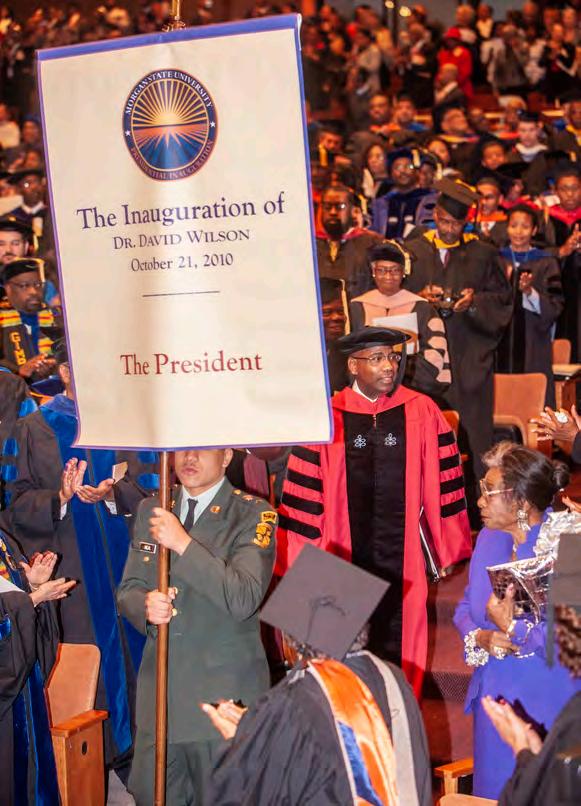

Celebrating Morgan’s Sesquicentennial
Morgan State University celebrated its 150th anniversary in grand style, with more than 80 events and ancillary activities held from December 2016 to December 2017. The activities engaged Morgan students, faculty, administrators, retirees, alumni and supporters of the University and the entire Morgan community, in a commemoration of the extraordinary role that Morgan has played in educating the citizens of Baltimore, Maryland, the nation and the world. The celebration began with a December 2016 worship service at Sharp Street Memorial United Methodist Church, the place of Morgan’s founding, and ended during the University’s Fall 2017 Commencement Exercises, which sent forth Morgan’s 141st graduating class.
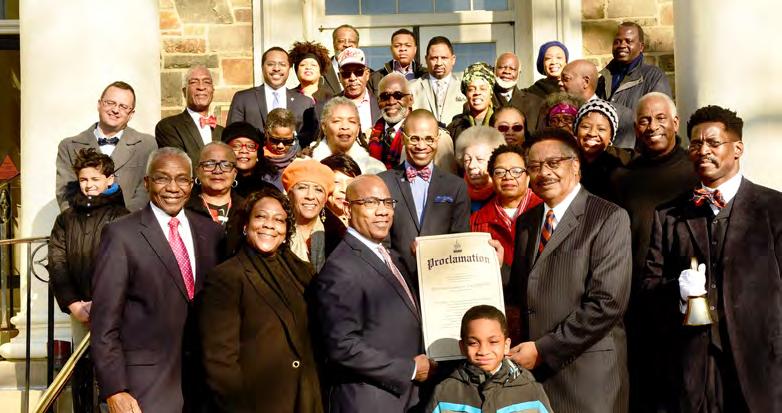
Four Living Presidents, in 2017: (left to right) Dr. Earl S. Richardson, Dr. David Wilson, King Virgil Cheek, J.D., and Dr. Andrew Billingsley

Morgan’s four living presidents, King Virgil Cheek, J.D., who served from 1971 to 1974, Andrew Billingsley, Ph.D. (1975–1984), Earl Richardson, Ed.D. (1984–2010) and David Wilson, Ed.D. (2010–present), who appeared together for the first time at the University’s Spring 2017 Undergraduate Commencement exercises Vision Statement
Morgan State University is the premier public urban research university in Maryland known for its excellence in teaching, intensive research, effective public service and community engagement. Morgan prepares diverse and competitive graduates for success in a global, interdependent society.
Mission Statement
Morgan State University serves the community, region, state, nation and world as an intellectual and creative resource by supporting, empowering and preparing highquality, diverse graduates to lead the world. The University offers innovative, inclusive and distinctive educational experiences to a broad cross-section of the population in a comprehensive range of disciplines at the baccalaureate, master’s, doctoral and professional degree levels. Through collaborative pursuits, scholarly research, creative endeavors and dedicated public service, the University gives significant priority to addressing societal problems, particularly those prevalent in urban communities.

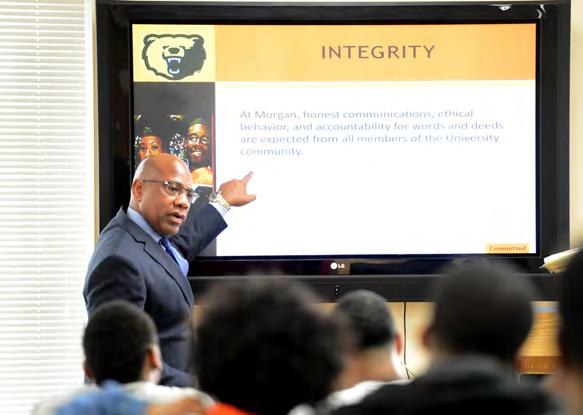

Values
Core Values
The core values below guide the promotion of student learning and success, faculty scholarship and research, and community engagement at Morgan:
Integrity. At Morgan, honest communications, ethical behavior and accountability for words and deeds are expected from all members of the University community.
Excellence.
Excellence in teaching, research, scholarship, creative endeavors, student services, and in all aspects of the University’s operations, is continuously pursued at Morgan to ensure institutional effectiveness and efficiency. Respect. Each person at Morgan is to be treated with respect and dignity and is to be treated equitably in all situations.
Diversity. A broad diversity of people and ideas are welcomed and supported at Morgan as essential to quality education in a global interdependent society. Students will have reasonable and affordable access to a comprehensive range of high-quality educational programs and services. Innovation. Morgan encourages and supports its faculty, staff and students in all forms of scholarship, including the Leadership. Morgan seeks to provide rigorous academic curricula and challenging co-curricular opportunities to promote the development of leadership qualities in students and to facilitate leadership development among faculty, staff and students. discovery and application of knowledge in teaching and learning and in developing innovative products and processes.

Strategic Goals
1
Goal 1: Enhancing Student Success Morgan will create an educational environment that enhances student success by hiring and retaining well qualified, experienced and dedicated faculty and staff, offering challenging, internationally relevant academic curricula, and welcoming and supporting a diverse and inclusive campus community.
2 3 4 5
Goal 2: Enhancing Morgan’s Status as a Doctoral Research University Morgan will enhance its status as a Doctoral Research University through its success in securing grants and contracts and its faculty’s achievements in basic and applied research, professional expression, artistic creation and creative inquiry. Additionally, initiatives will be designed to enhance doctoral achievement in the science, technology, engineering and mathematical (STEM) and non-STEM disciplines for underrepresented students of color.
Goal 3: Improving and Sustaining Morgan’s Infrastructure and Operational Processes Morgan will enhance its infrastructure and processes by improving the efficiency and efficacy of its operating procedures, by focusing on the environmental sustainability of its facilities and by meeting the technological customer service needs of its students, faculty, staff and community.
Goal 4: Growing Morgan’s Resources Morgan will expand its human capital as well as its financial resources by investing in the professional development of faculty, staff and students, seeking greater financial support from alumni, the State and federal governments, private and philanthropic sources, and establishing collaborative relationships with private and public entities. The issue of indirect costs associated with contracts and grants will be revisited.
Goal 5: Engaging With the Community Morgan will engage with community residents and officials in the use of knowledge derived from faculty and student research, the sharing of mutually beneficial resources, and the appropriate and timely dispatch of University experts and professionals to collaborate in addressing community concerns.







